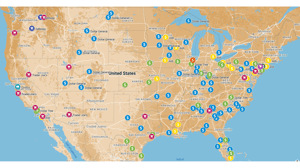Anycart Emerges With Eyes on Home Shopping, Home Cooking
Partnering with Amazon and Alberstons, the tech startup turns recipes into shopping baskets for delivery. Partnering with Amazon and Alberstons, the tech startup turns recipes into shopping baskets for delivery—and back into recipes.

Anycart, a startup tech company that turns online recipes into shoppable e-commerce baskets then back into recipes, said this week it was fast-tracking a public rollout and would absorb all delivery fees as it seeks trial from shoppers, brands, publishers and partner retailers looking to new and safer food-shopping solutions during the coronavirus pandemic, which has accompanied both a surge in online food shopping and big demand for help preparing that food at home.
“This is the best of times and the worst of times,” co-founder Payman Nejati told WGB in an interview this week. “It’s the worst because of the out-of-stocks and long delivery times affecting e-commerce. It’s the best, because for us, it’s mission-driven time. People really need access to food.”
Anycart, based in Palo Alto, Calif., has been operating in beta mode for about nine months and has agreements with Amazon’s Whole Foods Market chain and certain Albertsons Cos. banners. The company aligns those retailer’s inventories in local stores to an e-commerce site built around recipes, allowing shoppers to buy all the ingredients needed for a dish in a single click, with prices viewable on a per-plate basis.
The technology will also find additional recipes that can made from each meal’s leftovers—thereby reducing the per-plate cost as consumers shop—providing convenience and discovery, while also building large and profitable shopping baskets for retailer, Nejati said.
Shoppers may also use Anycart to shop by item as a traditional e-commerce site would. Shoppers choose their local store before they shop in the style of a marketplace. The orders are fulfilled and delivered by the retailers as though they came in directly from consumers. After they shop, consumers can use Anycart again to prepare the items they shopped for with step-by-step video recipes.
The result is something of a combination of a meal-kit provider with an online shopping concierge, only Anycart handles no inventory and leaves order picking and fulfillment to its partner retailers.
“The fundamental difference between us and Shipt and Instacart, is that we are at a time and place where most major grocers have their own systems of pickup and delivery,” Nejati maintains. “They don’t need a startup to come in and walk their store and hire more gig economy drivers to deliver. What they need are bigger baskets, so that people don’t order three items and make them lose money on the delivery. We are a basket builder.”

Image: anycart.com
Anycart makes money through affiliate fees from retail partners, advertising from brands who can get their products and recipes promoted in search, and partnerships with publishers whose content can also be turned into shoppable recipes on the site.
Other companies such as Chicory, Whisk and Basketful are similarly helping retailers generate shoppable recipes to populate their own retail sites.
Anycart is also developing a browser extension that would allow consumers to turn any online recipe into a shopping basket from a local retailer, Nejati said.
The long-term vision for Anycart remains an end-to-end solution for the “what’s for dinner?” conundrum for busy families in the style of a wide-ranging destination site such as Expedia. In typical times, that would mean a consumer could order that evening’s dinner on their commute home from work. But the onset of the coronavirus has changed much of the norms underpinning that vision, Nejati said. The mission now is to provide more convenient ways to shop as millions of consumers pursue e-commerce in order to shop safely from their homes, and are hitting recipe sites on the internet in record numbers.
That’s also why the company said it would absorb delivery fees during this period.
“This is not a time to monetize,” Nejati said. “This is a time to create brand trust and prove we are doing the right thing.” He said he was reaching out to additional retailers and would take them on without charging affiliate fees.
Anycart came out of the Amazon Alexa Accelerator program, where it demonstrated it could provide a branded experience: Turning a recipe request to Alexa into a shopping basket at Whole Foods, delivery from Amazon Prime Now and prep again with Alexa.
When it sought a round of funding, it found a willing partner in Greycroft, a New York-based venture capital firm that established a $50 million fund to support grocery innovation in partnership with Albertsons. That helped Anycart forge a partnership with Albertsons banners, including Safeway, Albertsons, Vons, Pavilions, Randalls, Jewel-Osco, and Tom Thumb, where it is currently available. Greycroft was also behind food tech companies Shipt and Plated.
The company is also hoping to lure additional retailers on board. “We’re not asking for affiliate fees, we’re just asking, can we add your store as a checkout option and see what happens? That’s the message we want to get to retailers. For CPGs and publishers, know that you can use Anycart to make all your content shoppable. It's a solution that anyone that has an audience can make your content shoppable.”
About the Author
You May Also Like






